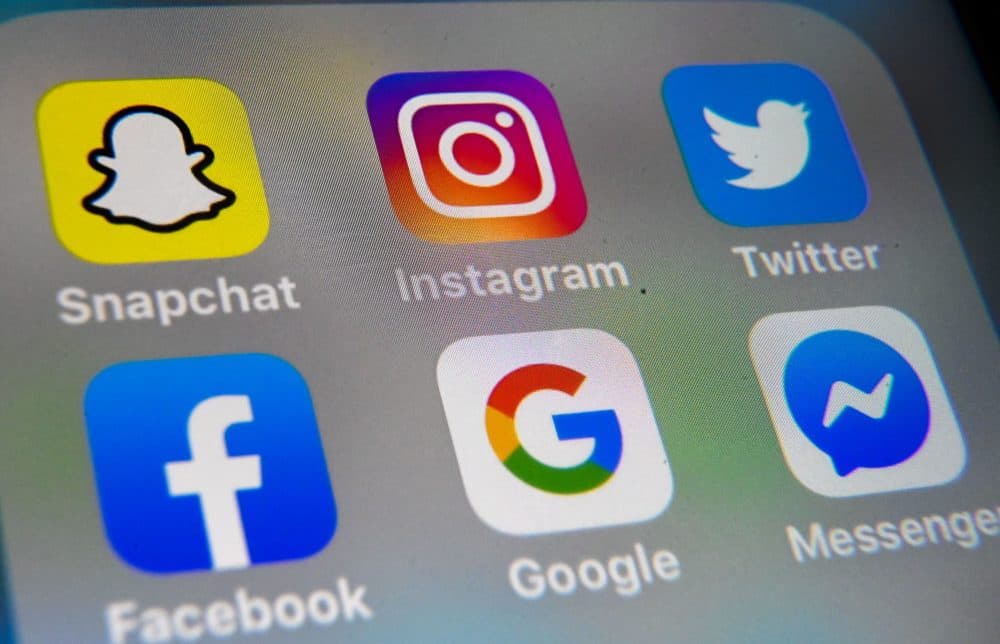Advertisement
Tech Ethicist Tristan Harris Says 'Digital Democracy' Is Needed To Correct 'A System Of Harms'
Resume
Facebook's new independent oversight board is supposed to make the company more accountable to its users. But technology ethicists like Tristan Harris say tech giants have a long way to go in supporting what he calls "digital democracy."
Renewed calls to further regulate social media companies and police misinformation following the Capitol insurrection are putting a new spotlight on the role of technology in our lives. Harris, who was featured prominently in the Netflix film "The Social Dilemma,” has been thinking about this subject for a long time.
In the new anthology, “The New Possible: Visions of Our World Beyond Crisis,” Harris and his coauthors write that at the root of society’s problems with technology, the environment and racial injustice is an economic system “that is fundamentally not compatible with long-term survival.”
In the social media industry, the business model relies on sucking our attention spans until there’s nothing left, Harris says. It’s also designed to allow for “unchecked virality,” meaning companies profit off the rampant spread of powerful misinformation.
“Our mind is more profitable as dead slabs of predictable behavior, dead slabs of human attention,” he says, “than as our own free choices that are not influenced by these screens and these artificial intelligence social media news feeds that are pointed at our brains every day.”
The problem with this logic is that it has created all sorts of consequences: shortened attention spans, conspiracy thinking, isolation, polarization and mental health issues, Harris says. Now social media companies are taking steps to mitigate the effects — from screen time tracking and privacy features — but it’s not enough to change their core.
“It's very hard to change Facebook or Twitter or YouTube's business model away from its intrinsic DNA,” he says. “It's sort of like saying we need to change football so that it doesn't cause concussions.”
Harris says the aftermath of the Capitol riot put into sharper focus what we already knew: We’re now living in a digital democracy that is controlled by a few private technology companies with immense amounts of power.
“As what it means to be a citizen shifts into these digital platforms, they have to actually serve and be responsible and accountable in democratic ways,” Harris says. “I've called for something almost like a digital constitutional convention because we also don't want these platforms to be autocratically decided by, you know, [Twitter CEO] Jack Dorsey waking up one day from an island in Tahiti and saying, ‘Off goes Trump.’ ”
When Harris talks about regulation of social media, he says he’s not calling for the government to have more power to limit free speech on the internet. The kind of regulation he’s talking about would stop companies from profiting off of fake news.
“What we really want when we talk about the phrase humane technology is a world where we are not the products, we are the customer,” he says, “and technology does not in any way have an incentive to control us, but instead is subservient to empowering us and allowing us to free up our minds to do things that are most important.”
In the meantime, it can be easy to feel hopeless and want to withdraw from social media altogether. But instead of completely unplugging — though Harris admits breaks are good for the mind — he encourages people to think more critically about how they approach the social media ecosystem and their place in it.
“I'm optimistic that more and more people are waking up to the fact that we've been part of a toxic hypnotic spell for something like 10 years now of society being sent through the washing machine of these news feeds,” he says. “And we now have to kind of wake up. But like a hypnotist, you just snap your fingers and all you have to do is realize it.”
Chris Bentley produced and edited this interview for broadcast with Tinku Ray. Samantha Raphelson adapted it for the web.
This segment aired on February 8, 2021.

